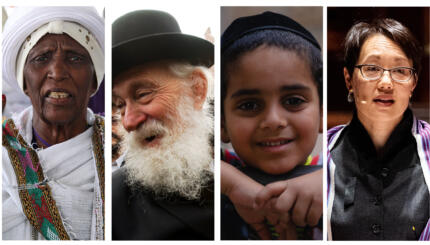“Jews are dogs, killers of Christ!”
The shouts came from an irate woman as I was walking into one of our Southern congregations for Shabbat. At first, I could not make out what she was saying. Then, it became clear:
Angry division is dangerous.
“Jews are dogs! Killers of Christ!”
She began to quote some scripture, which implied that our Jewish spiritual path is the path of sinners and we are either the devil or a slave to him. In either case, it was clear – to her – that we were destined for hell. Feeling accosted, I debated whether or not I should respond. For the sake of our people and our rich Jewish heritage, eventually I decided in the affirmative. After all, we’re no push-overs! I yelled back:
“Hey, if you’re going to quote scripture, why not ‘love your neighbor as yourself’’?! Surely, it’s a better representation of Jesus the JEW’s theology!”
She mumbled something profane and continued on her way.
I called after her with the departing words: “May God bless you!”
Moments of misunderstanding like this are too common, even today. In fact, leaving this moment, I walked into the congregation and right into another moment of misunderstanding: a member of the congregation, a concerned father, approached me with this story:
“My daughter came home with this certificate from her public school volleyball team. See! There’s her picture next to the verse: ‘I can do all through Christ, who strengthens me.’ Rabbi, what are we to do?”
His frustrations, like mine a moment ago, were palpable. In such moments of misunderstanding, we feel horrified, as if we are the butt of someone’s awful joke, victims of someone’s senseless act of violence. And, in such moments, we may desire retribution, seeking to return anger with anger, hurt with hurt, bruise with bruise, hoping then we may feel absolved of our pain.
“But, from my experience,” I explained to this father and a small group of fellow congregants who had gathered around, “there’s no remedy to be found in that course of treatment. For what we are coming face-to-face with is not true anger but ignorance, not deep-seeded hatred but hard-headed-ness. That can’t be fixed by acting in kind. Doing so amounts to little more than the knocking of heads, leaving everyone with headaches! Trust me.”
So, at that moment, I provided this father and others who may be in a similar place with these words of guidance. I suggested not always using these exact words verbatim, but following the general formula, and particularly the caring tone in which they are offered. For they beseech both the individual as well as that greater essence which pervades our lives, the Divine Oneness behind all that is. These are the words I suggested, using the example of the volleyball team picture and my own experiences and perspective:
“I know your inclusion of this text was done with the best of intentions. It is a beautiful sentiment from Paul, as many understand his words to mean: ‘I can do all through God, who strengthens me.’ In fact, if that was all it said, without the citation of Philippians 4:13, there would be much less cause for concern.
However, please understand, when prayers are given from a specifically Christian lens (i.e. “in the name of Jesus we pray”), when Bible studies commenced from only Christian sources, when certificates and gym rooms are plastered with quotes from the New Testament, what you are really saying to a valued member of your team, who happens to be of a different faith, is: You are not one of us; you do not belong.
Again, I know that was not your intent. But, honestly, that is how it is being heard. Because, with all due respect to your beliefs, Jews do not believe the Messiah has come yet. Thus, in the case of Jesus, we see him as just another son or man of God, as you and I are. For we all are children of the Father, the Holy One, blessed be God.
Coach, I deeply respect the time and energy you are giving to this team and its members. It reminds me a little of what it was like being a Chaplain in the United States Air Force. And, one of the things I learned there is that the differences of every team member are not a hindrance but an asset, not an obstacle to be overcome towards your goal but a tool to achieve it.
I hope that you will consider my words as you continue on to what I pray will be a great season for the team and every individual member therein. May God continue to bless you as you continue to be a blessing to others.”
Coming together, we are all more whole.
In the face of such moments of maltreatment, we may think of sounding the retreat, leaving the front lines of Jewish life for the safe zones of suburbia where large Jewish populations have gathered. While this may seem “safer”, it ultimately puts Judaism in greater jeopardy. For then no one will be left to stand guard and confront these moments with the sensitivity and knowledge needed to halt the advance of ignorance moving towards us and our Jewish brothers and sisters across our country. It is a blessing that we in smaller communities can share: increased awareness, and building bridges with our neighbors.


